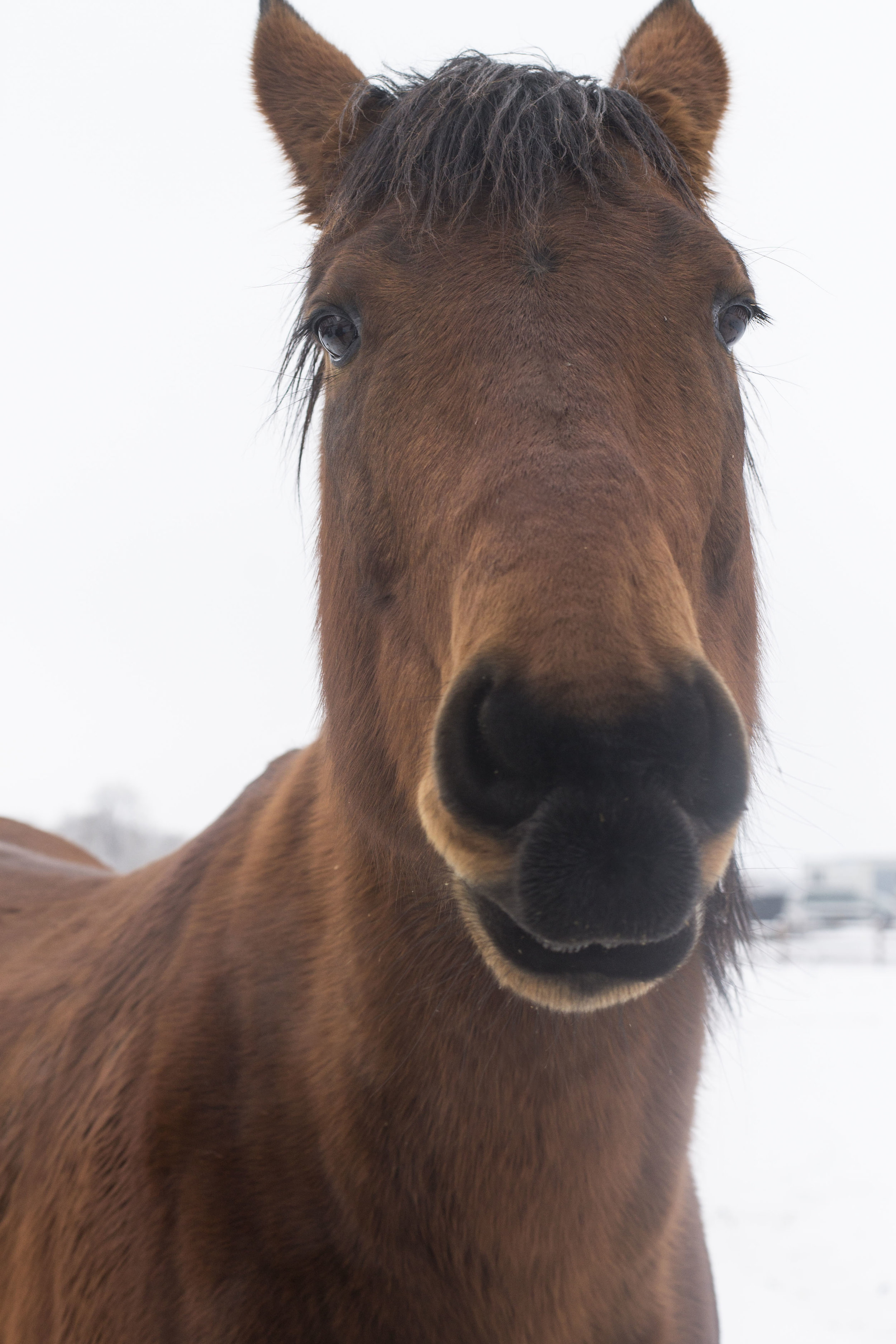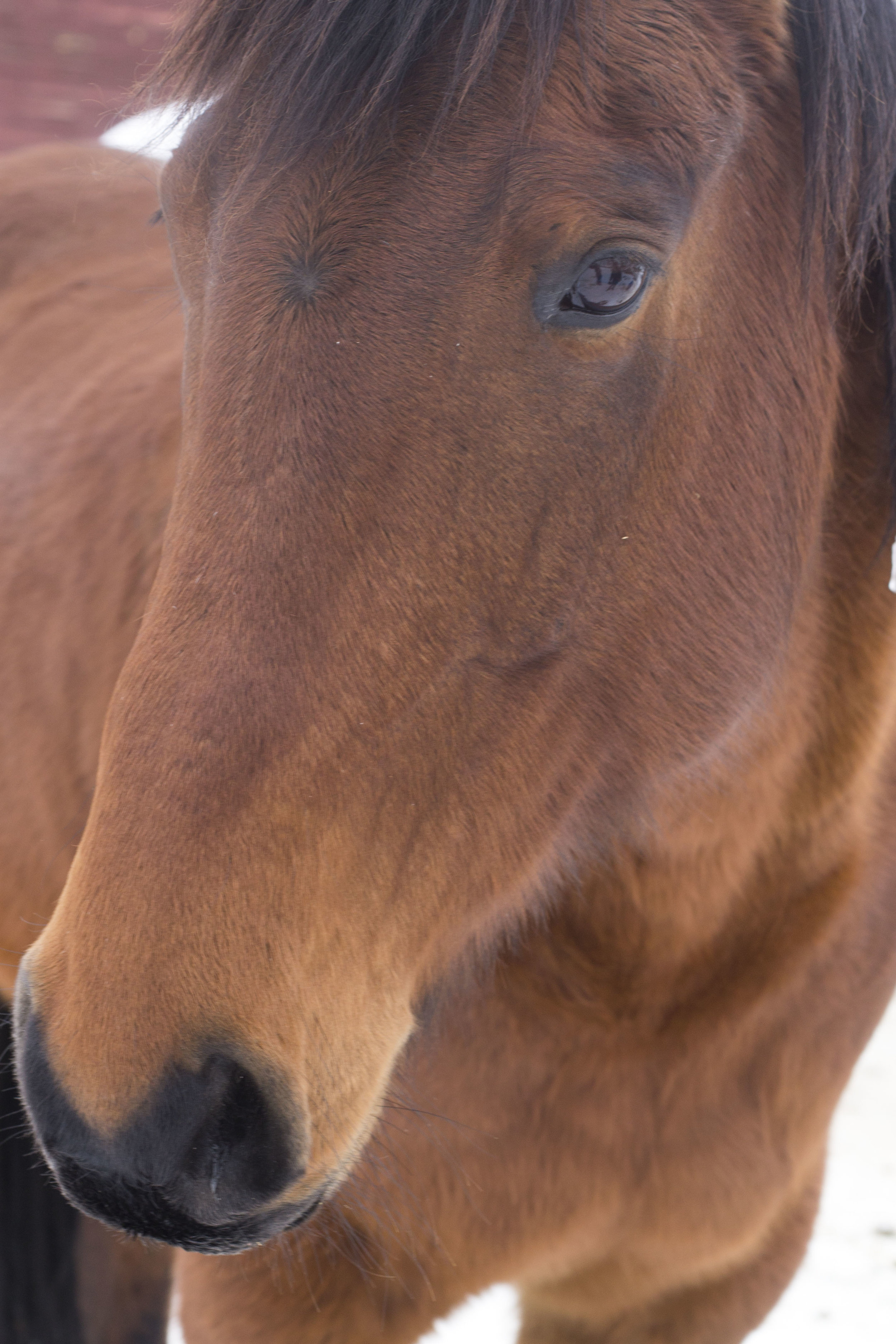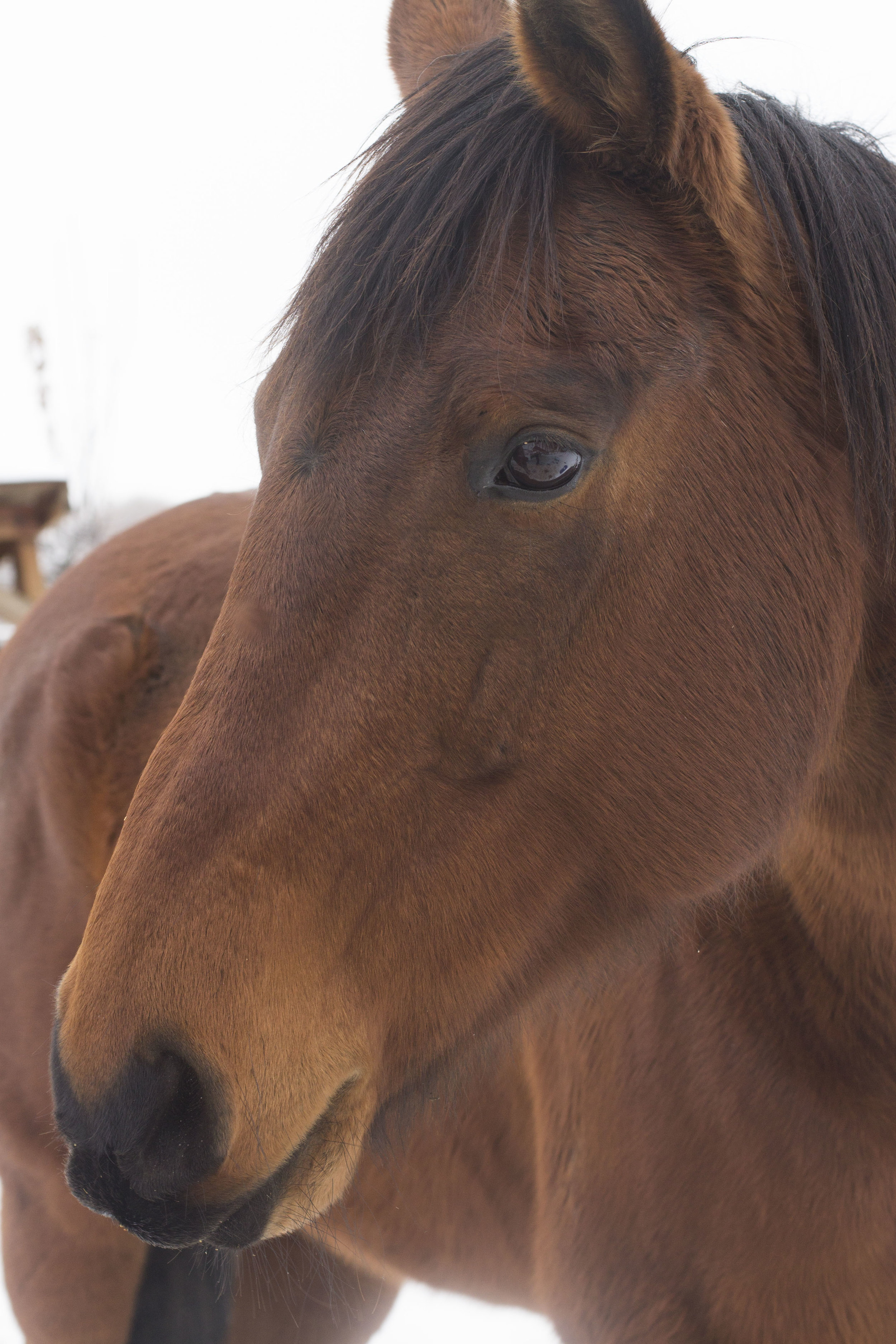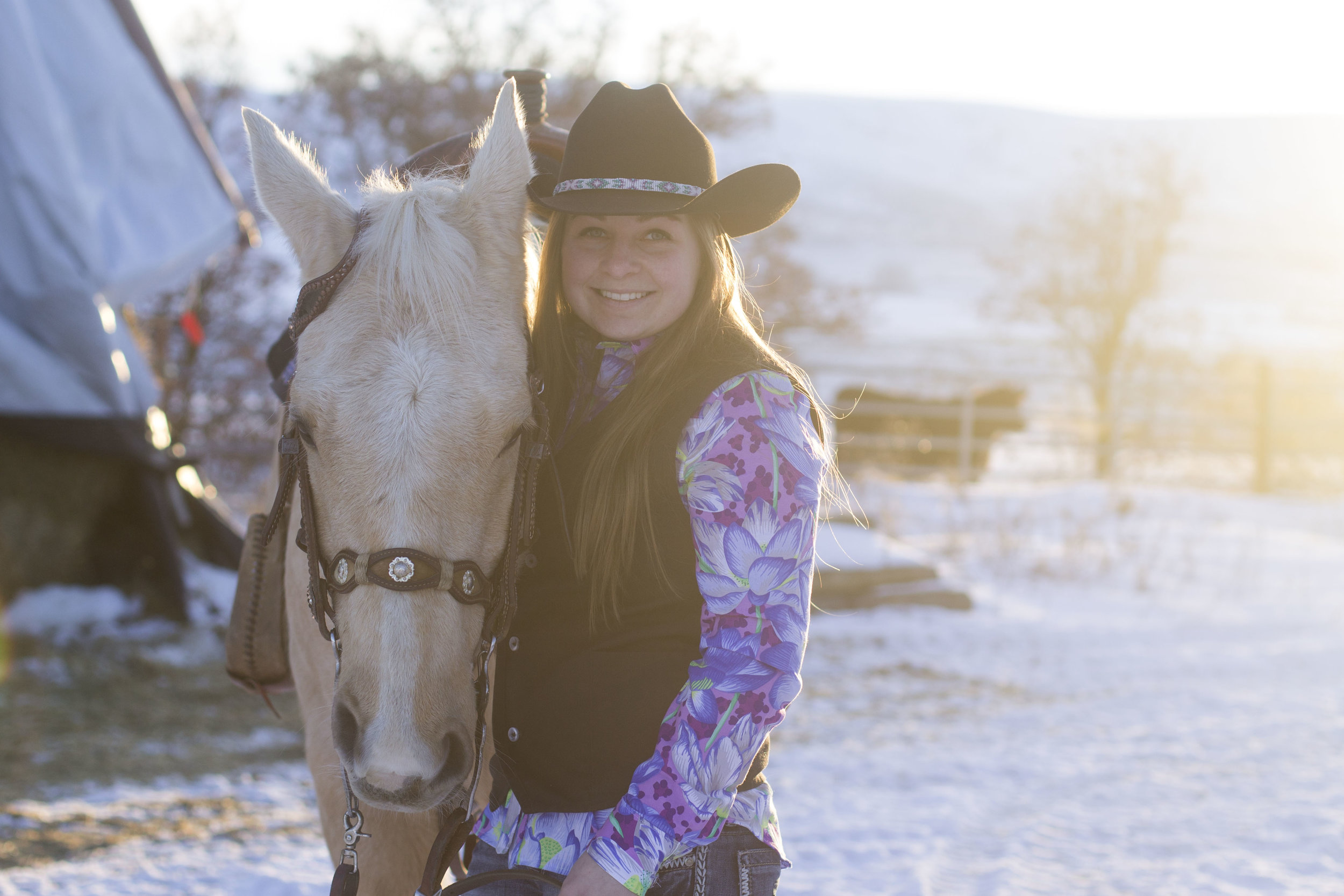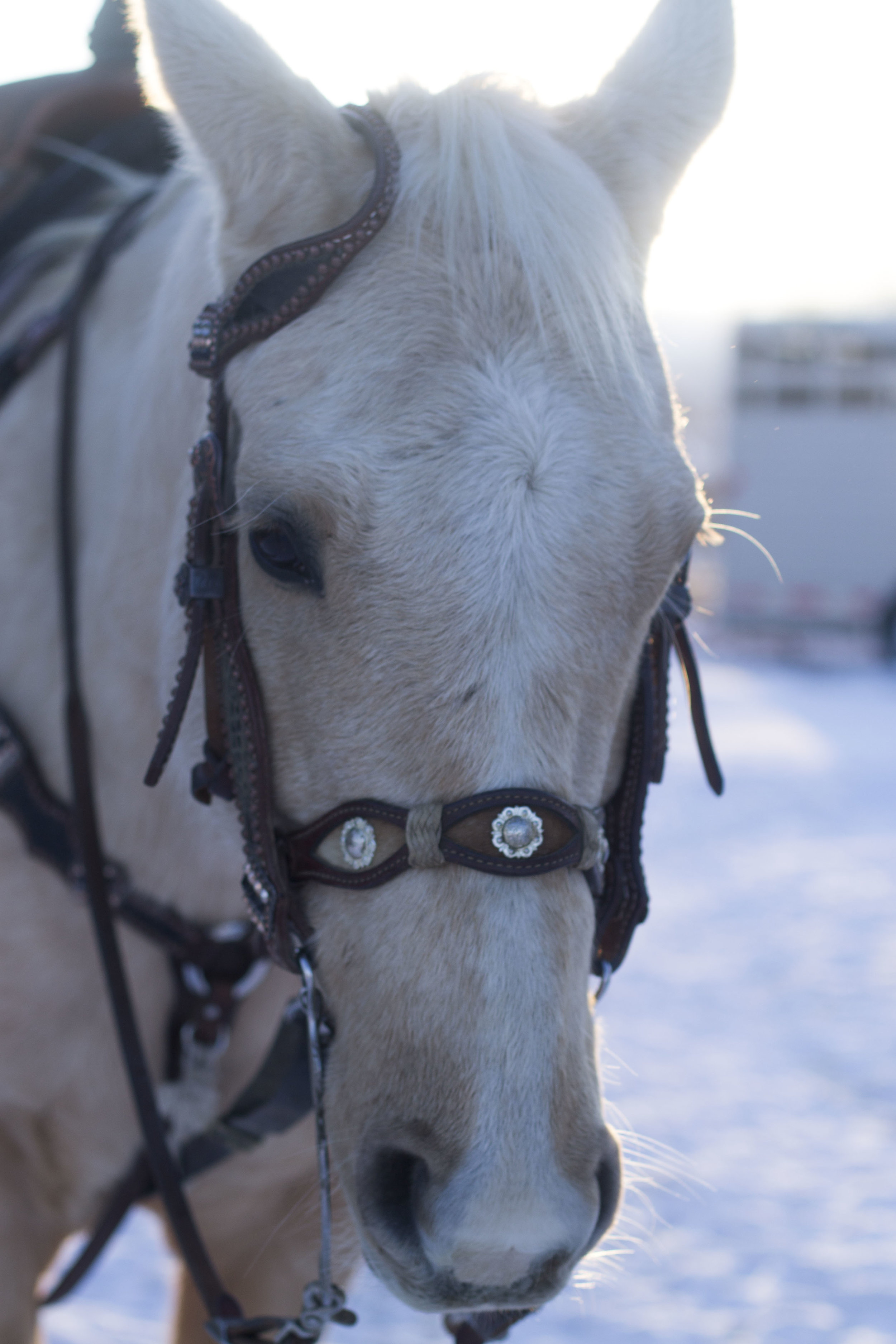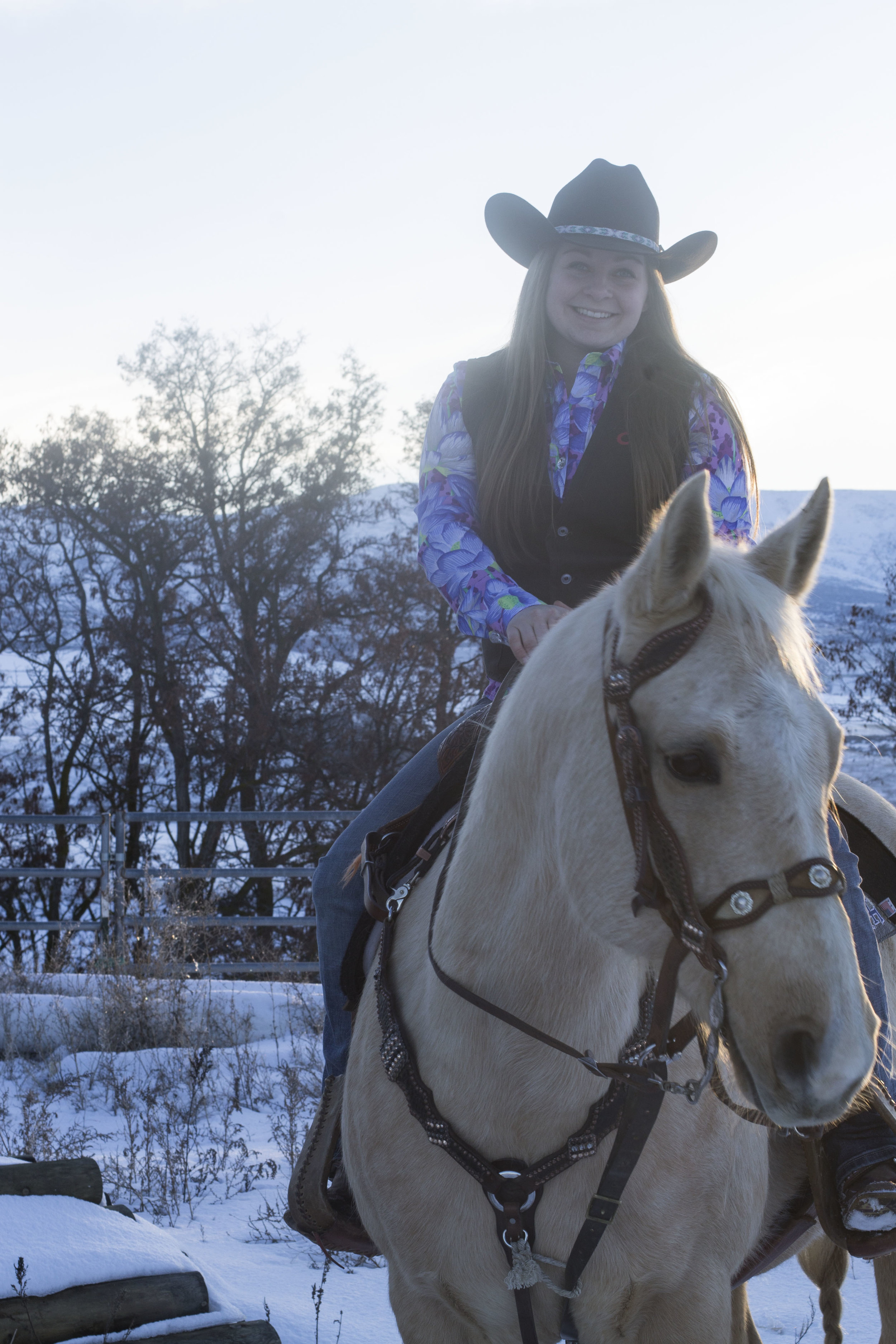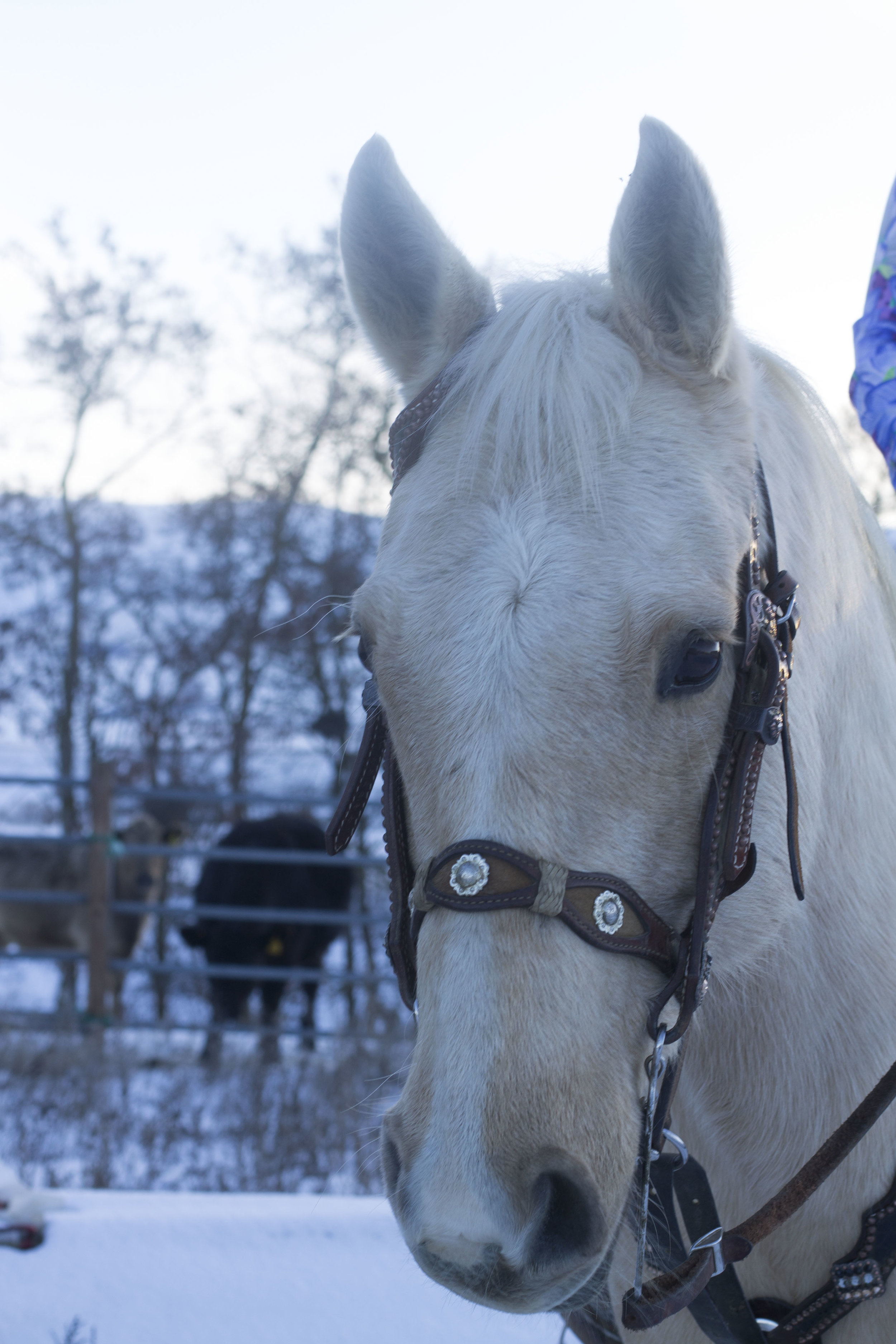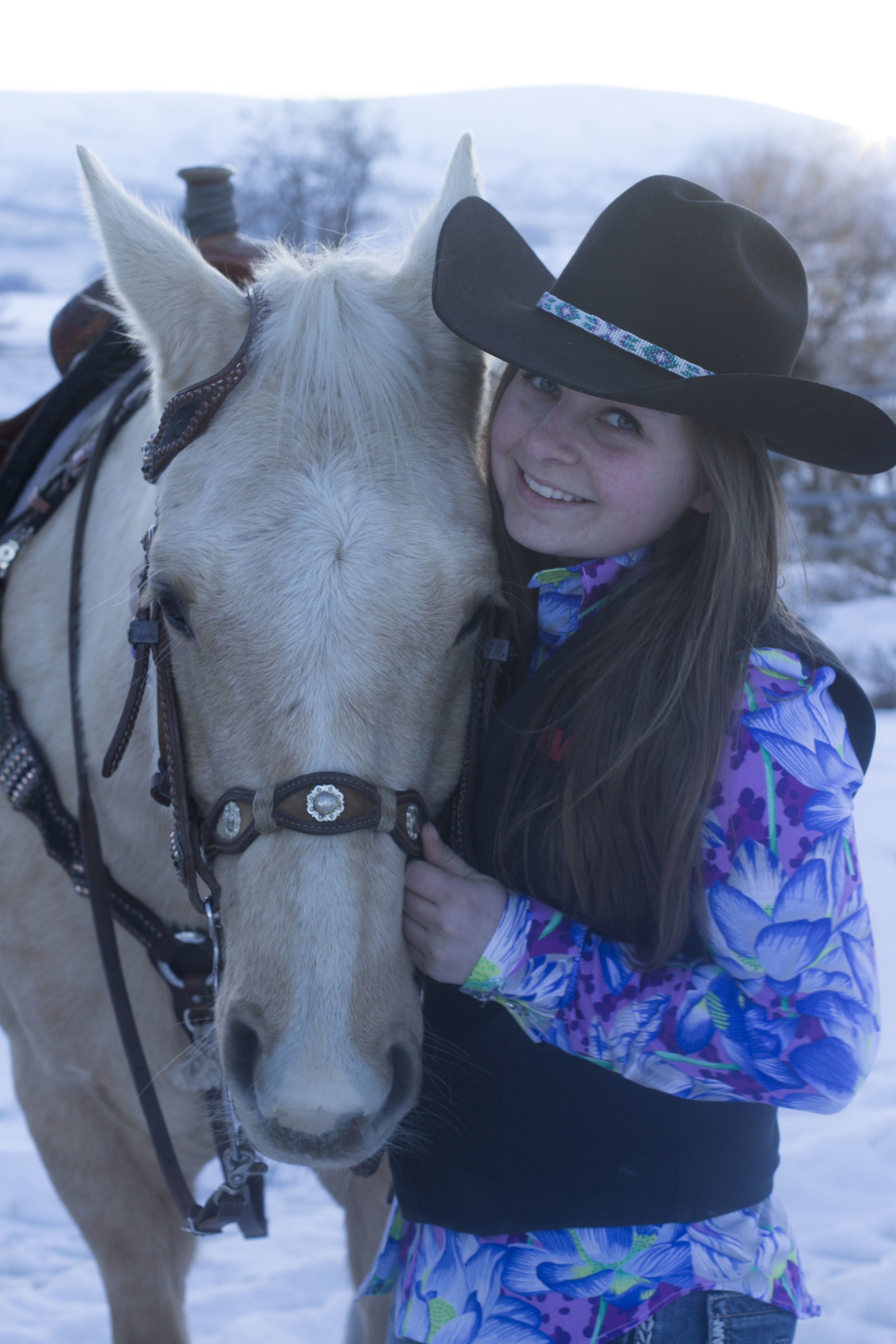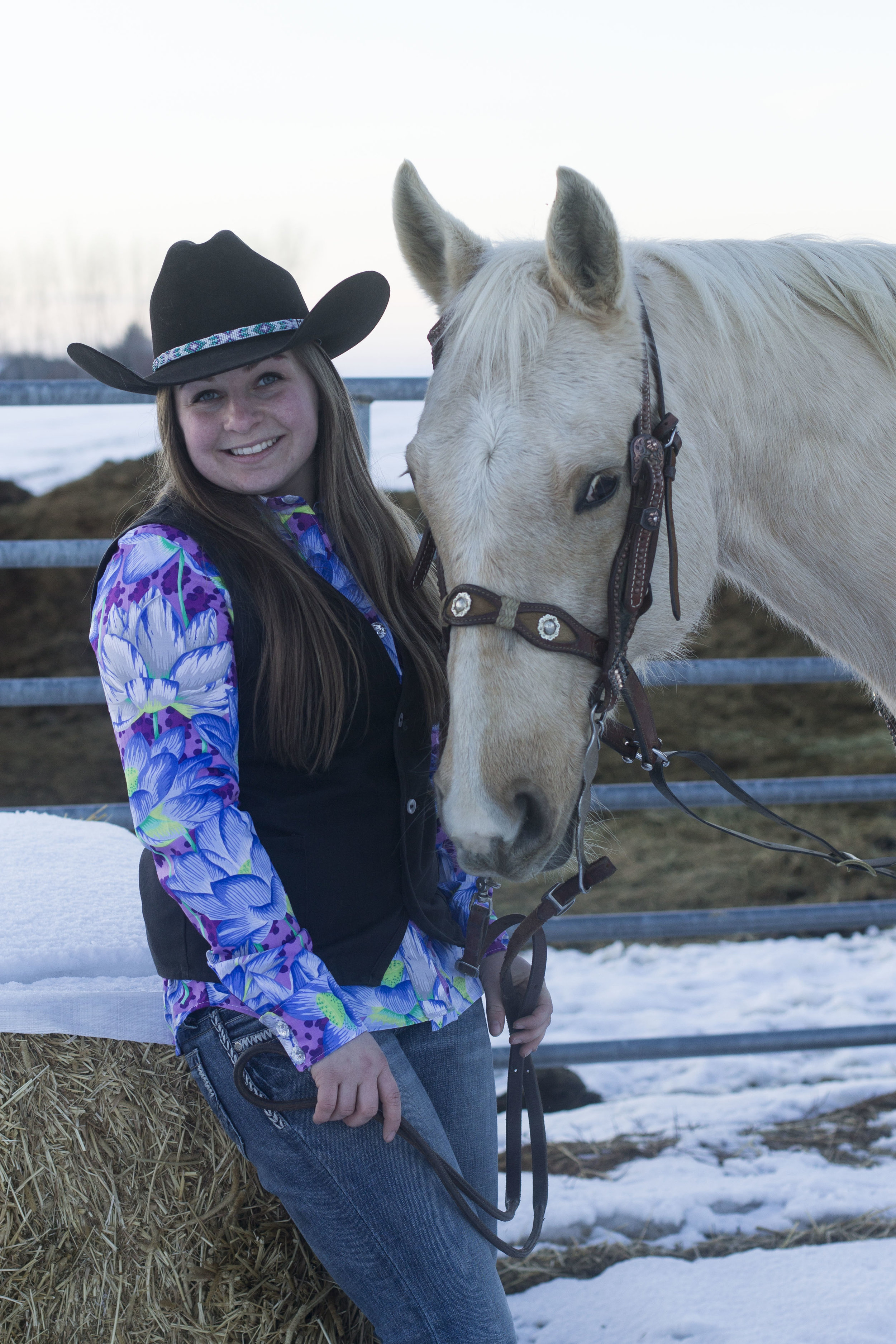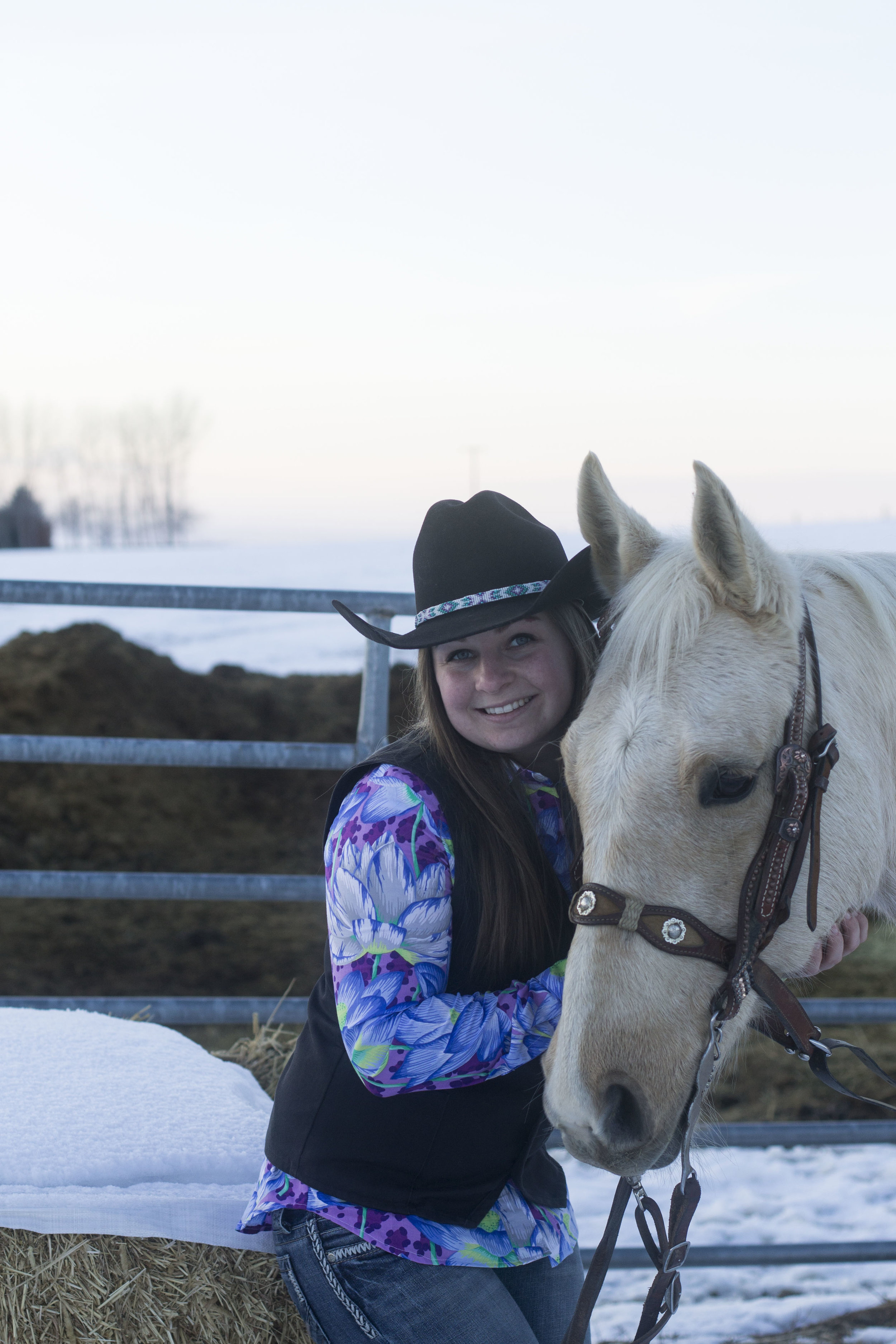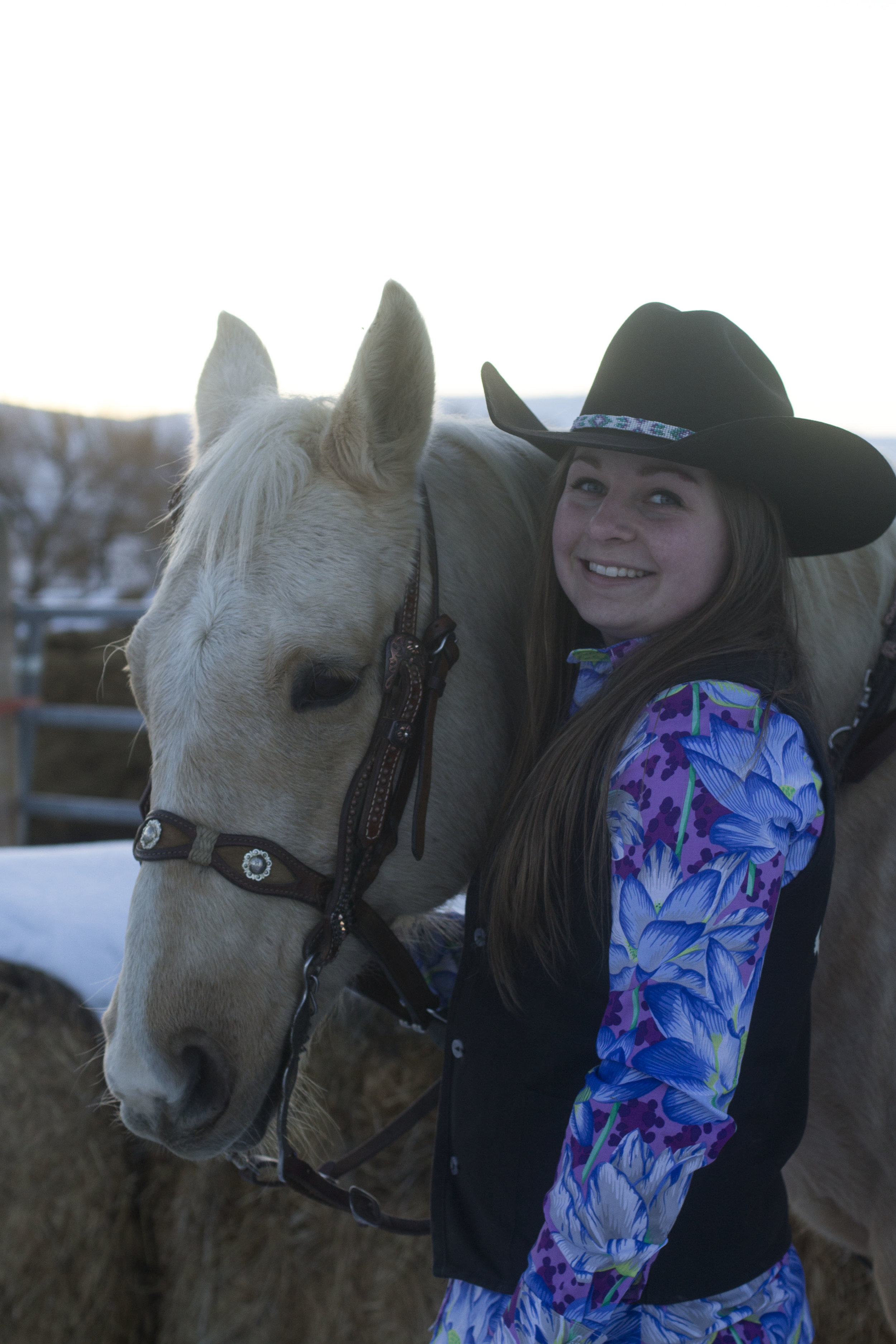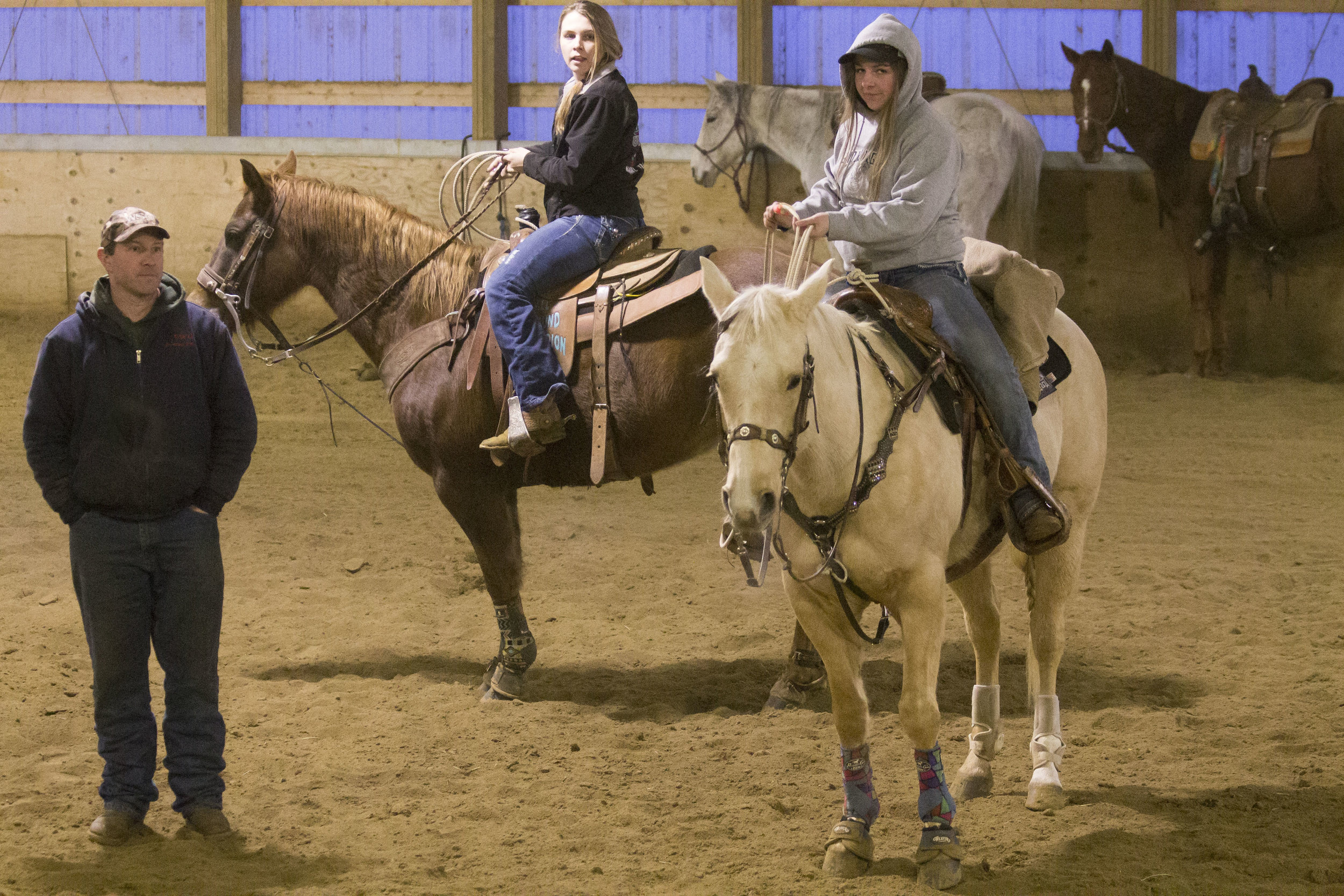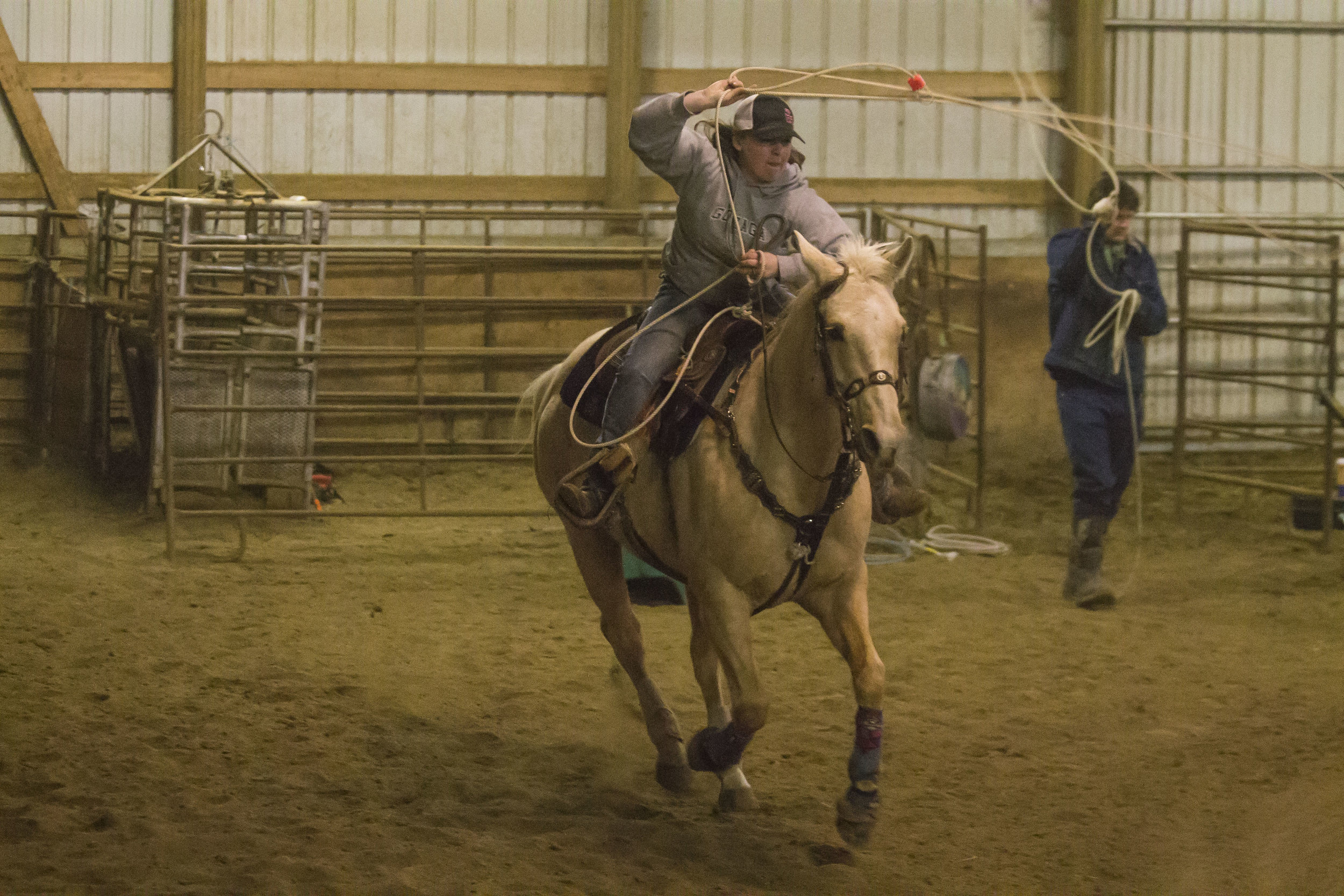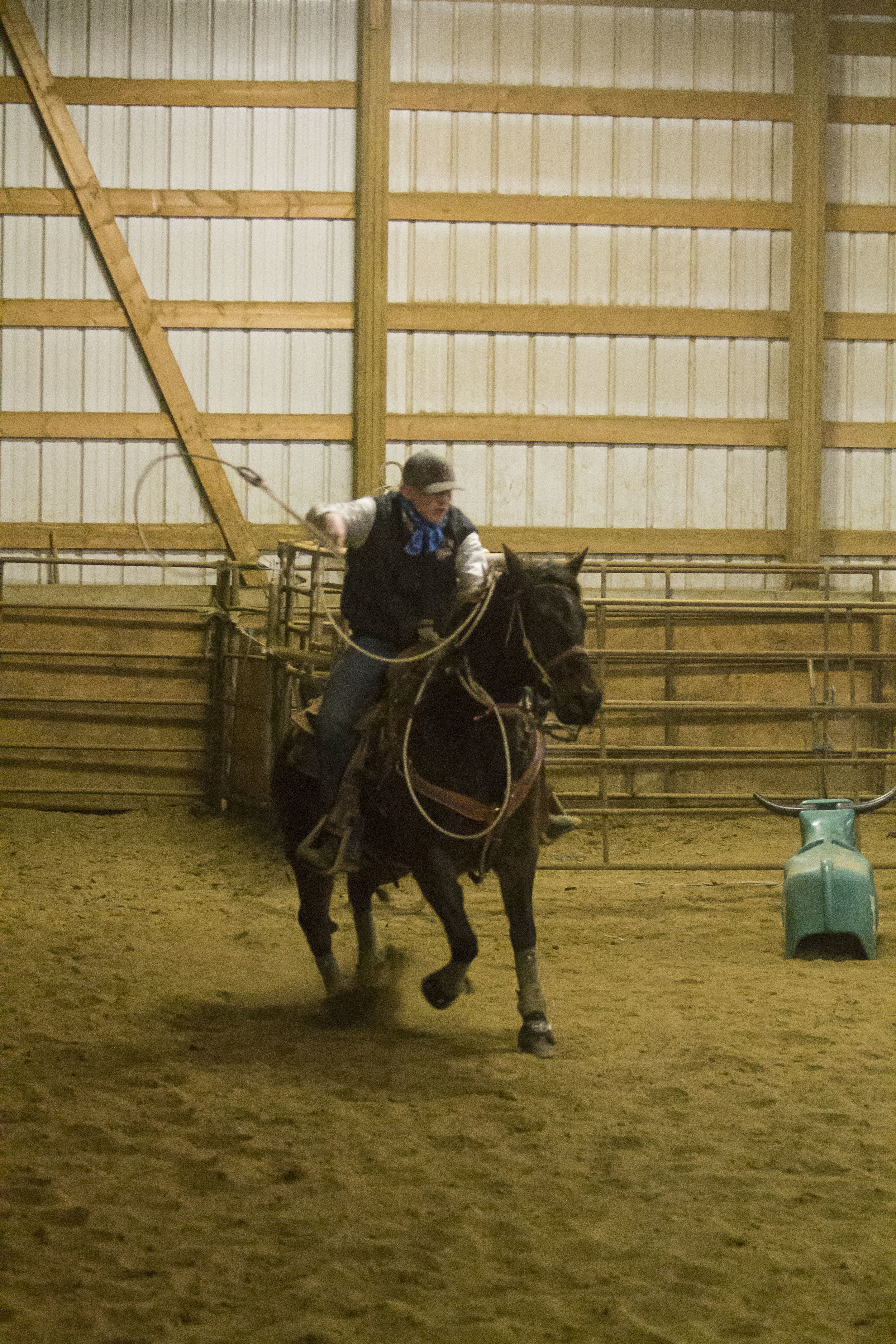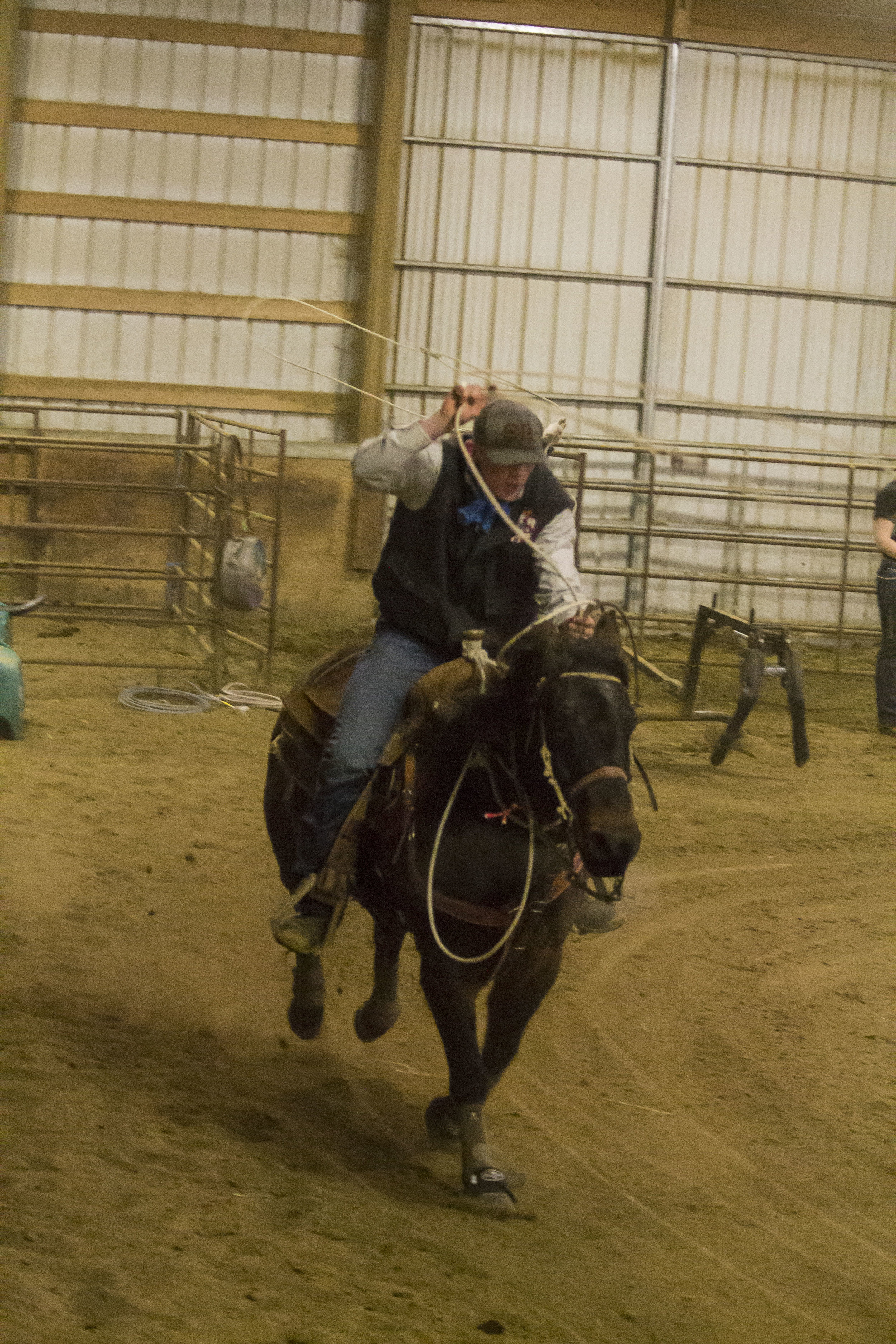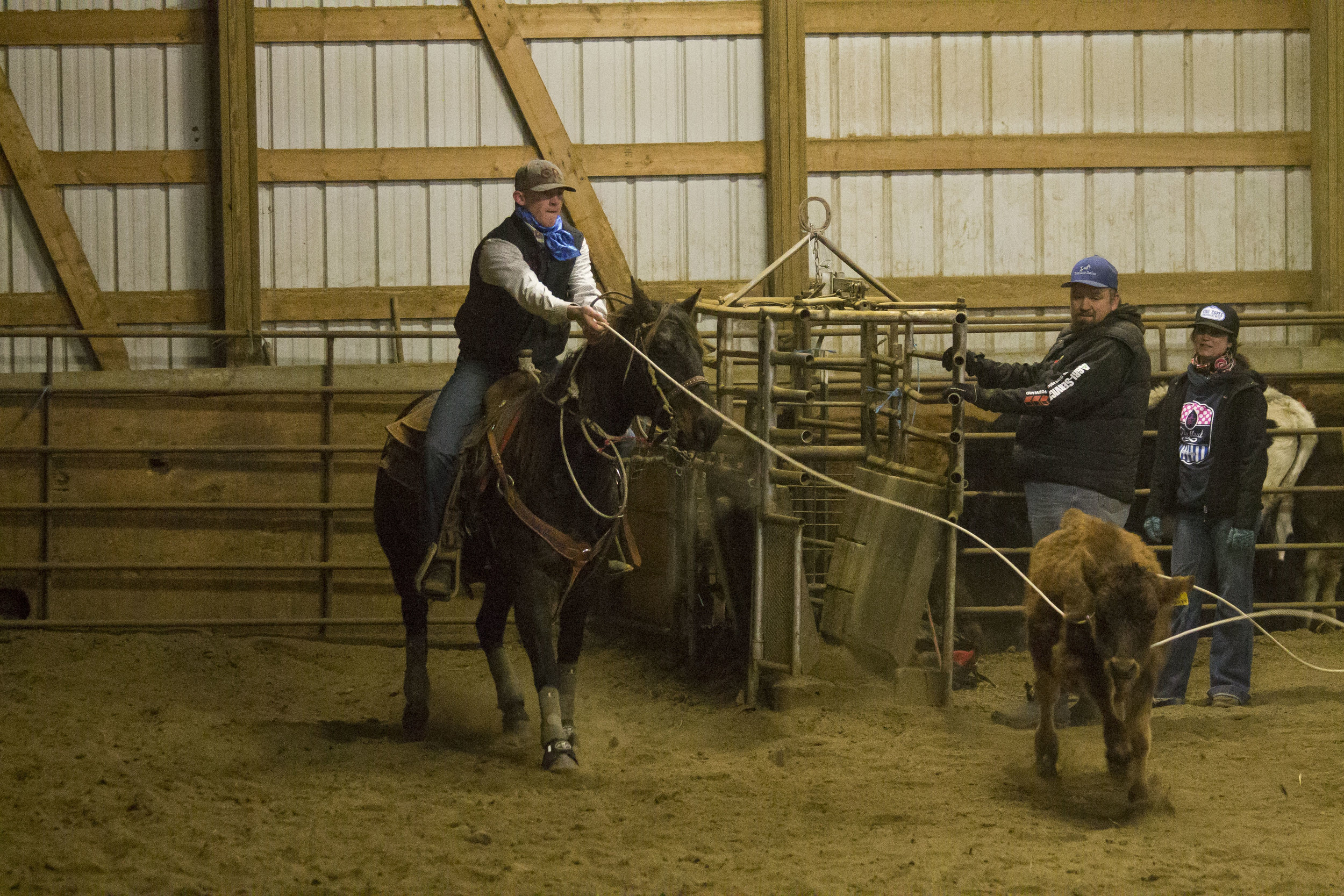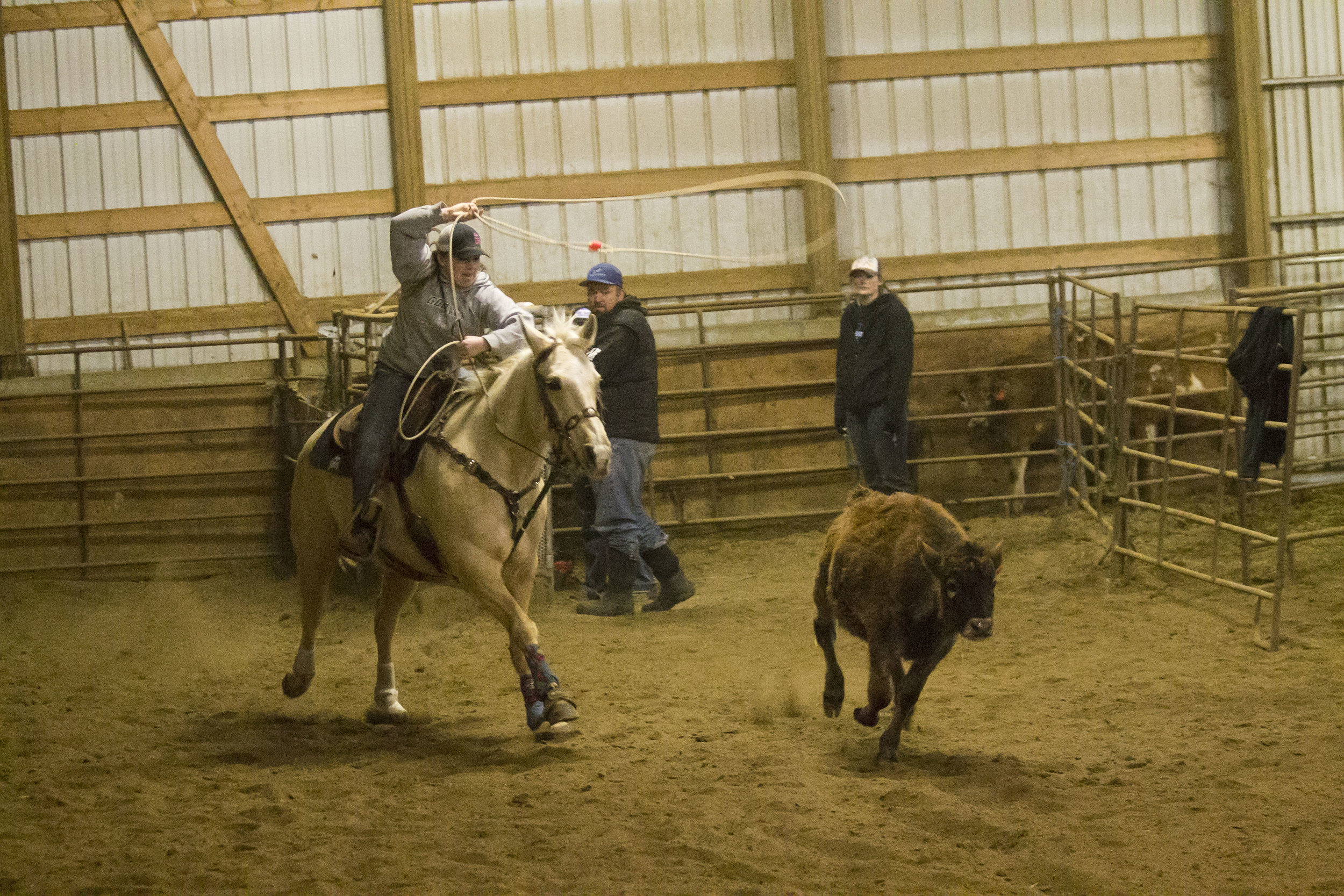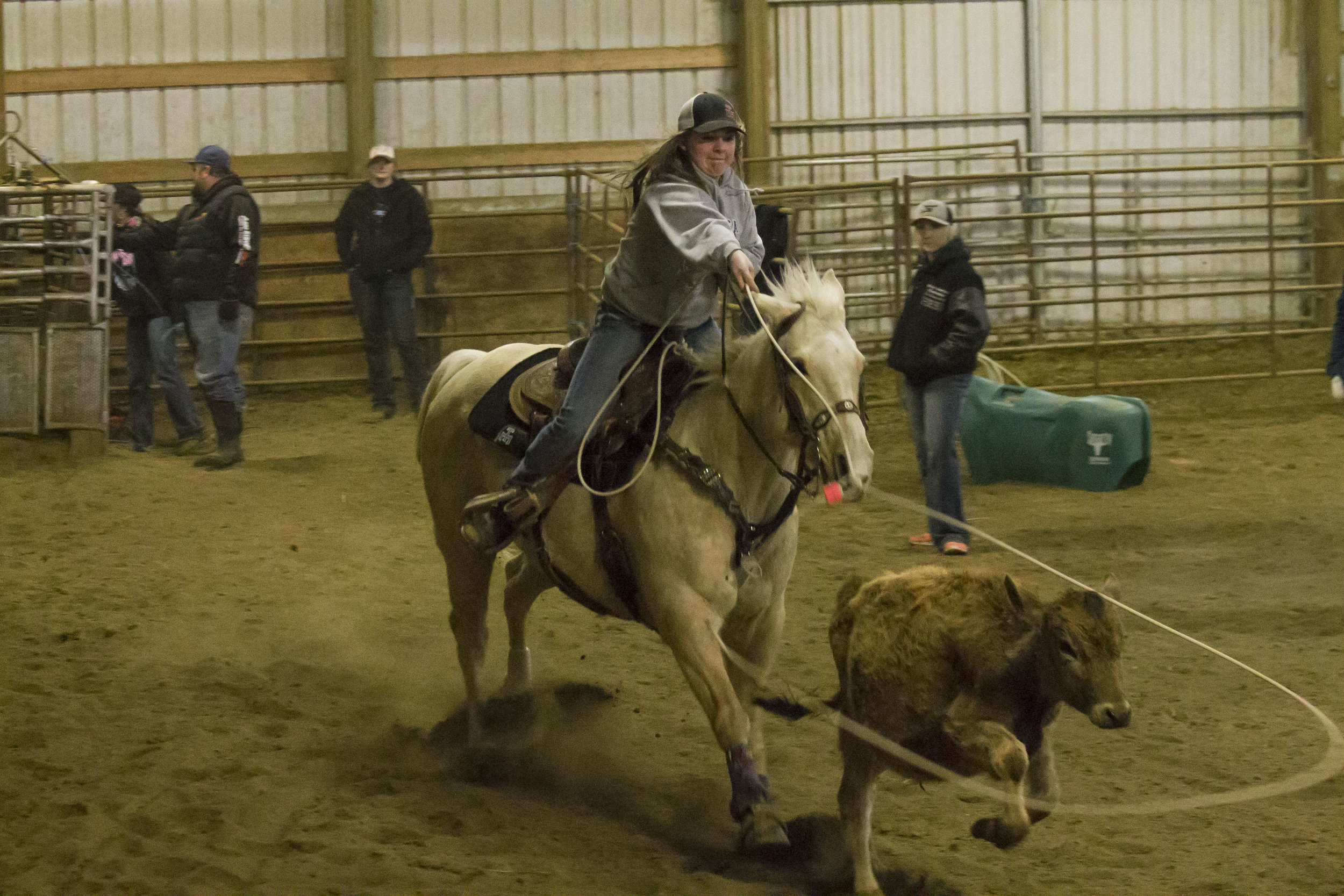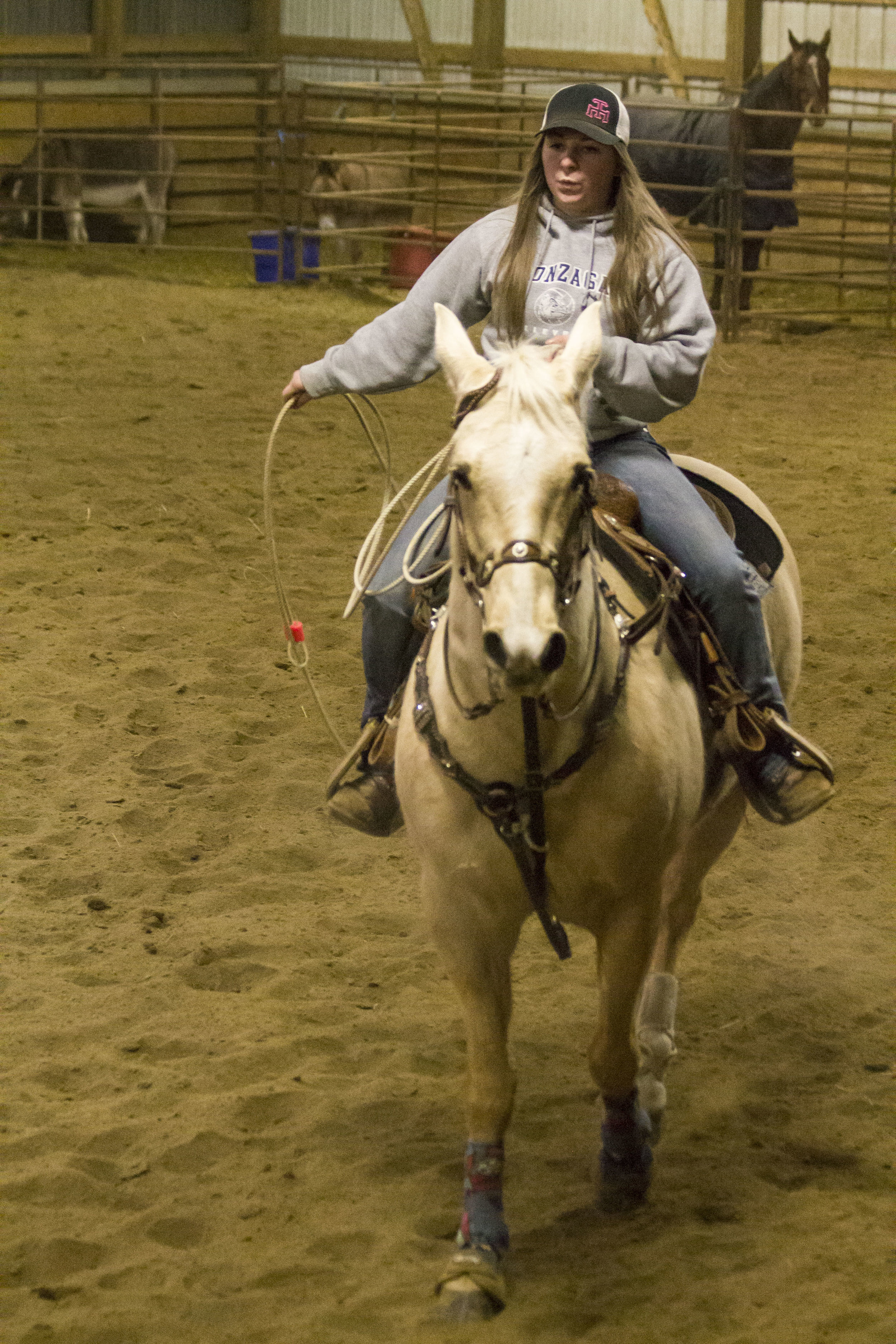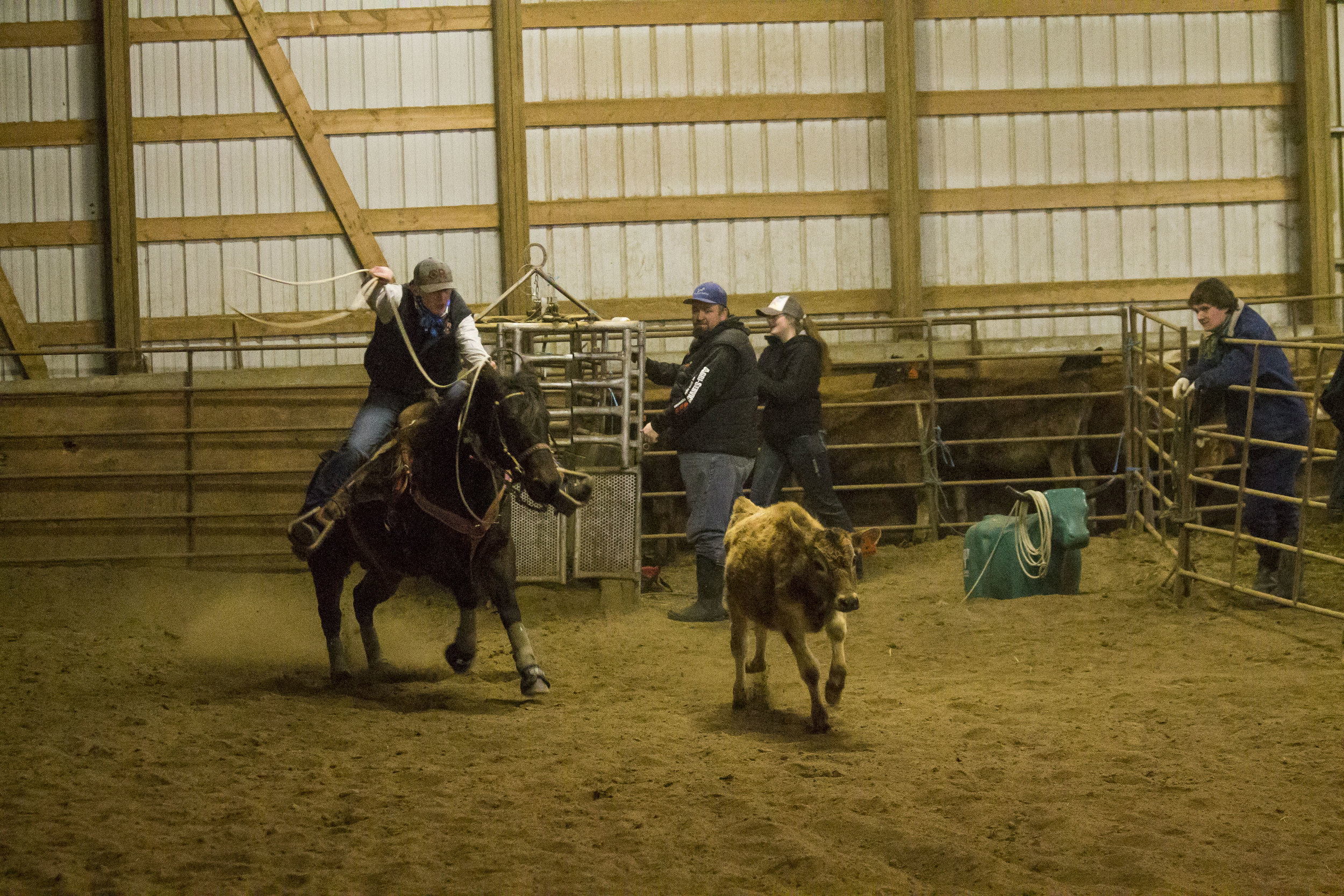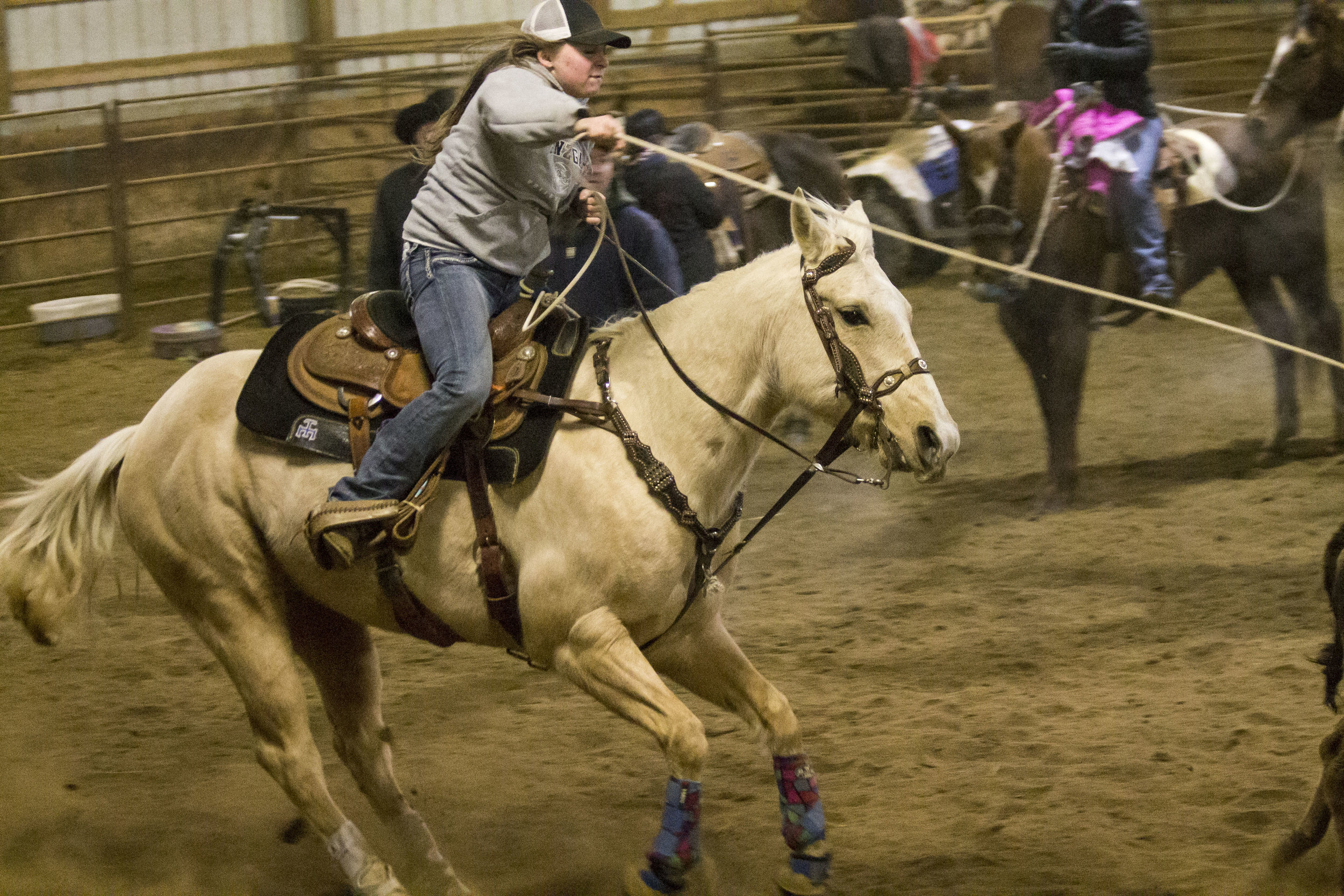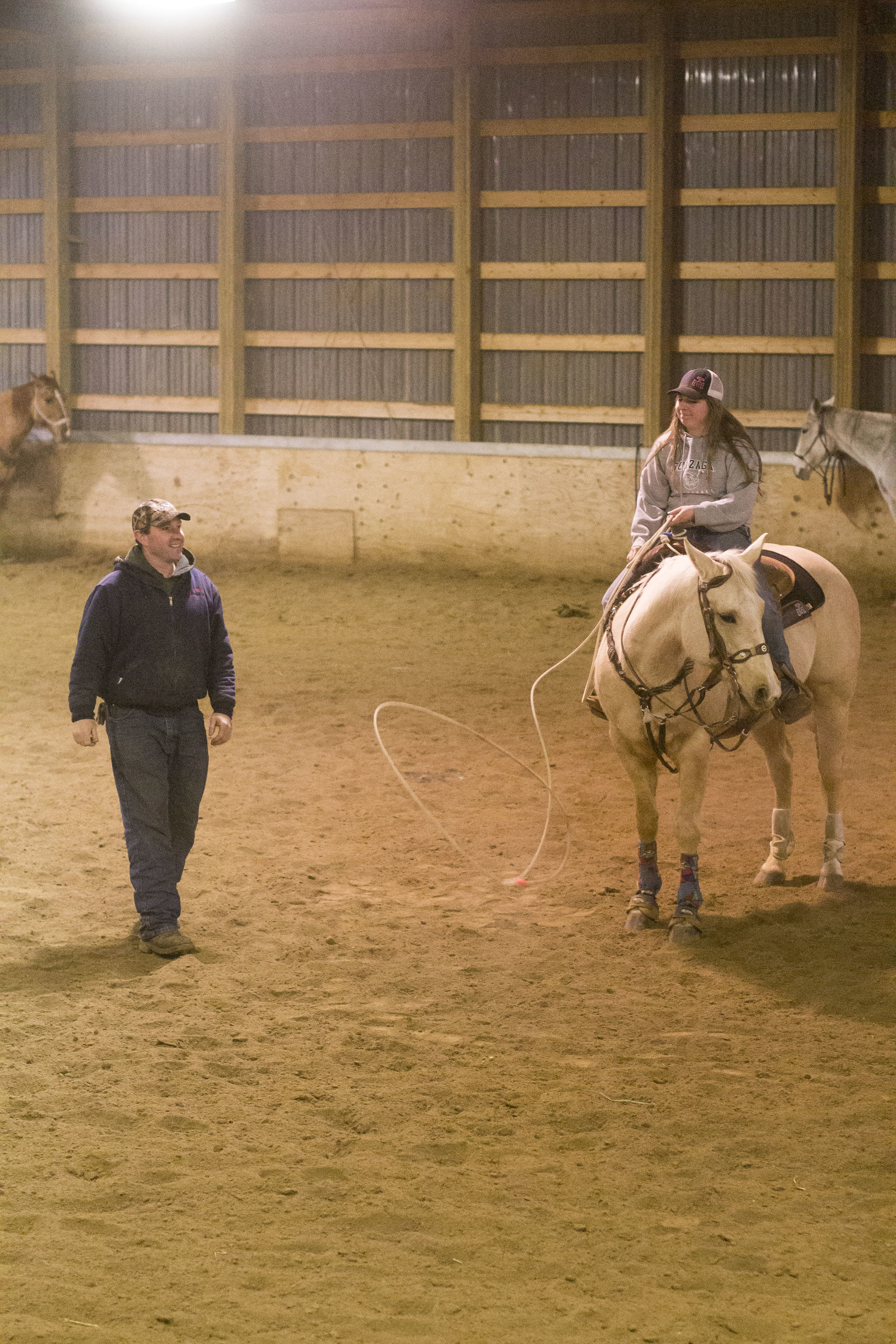1,200-Pound Athlete
Story By: Jonnie Crossland // Photos By: Elizabeth Weddle
You speak to this athlete through your body language, with the gentle touch of your hand. This athlete has all the power to win you the gold buckle, or land you in the hospital. This athlete is up to ten times your size, with a mind of its own.
This athlete is the horse of college rodeo.
Ellensburg is home to some of the most famous cowboys and cowgirls, and one of the most famous rodeos in the country. Because the town is a natural cowboy attraction, college rodeo students come to Central not just for an education, but also to compete on the college rodeo team.
The team has some of the most talented horses in the Northwest Region, and even the country. For the last three years, Central has sent some of its finest athletes to the College National Finals Rodeo (CNFR) in Casper, Wyo.
But what makes Central’s college rodeo athletes successful? Rodeo is a team sport between the horse and its rider, and the performance of the horse can make or break your success in rodeo.
MEET THE ATHLETES
Central student Jordan Tye and his horse, Mac Bandito Jiggs, or ‘Mac’ for short, currently lead in the calf roping event for the Northwest Region. They’ve been competing together since the fall, but Mac has already started to make his name known in the region. He is a nine-year-old sorrel gelding that has ranching experience, but as a team, Jordan is working to bring Mac to new heights in rodeo competitions.
Central student Kiley Streeter and her barrel racing, breakaway roping, and team roping horse, Roxy, are no stranger to the region and winning. Roxy was Streeter’s sister’s horse, and qualified for the CNFR three years in a row for barrel racing. This 13-year-old sorrel mare is proving herself as a breakaway horse this year, leading the event in the region. She is also sixth in the barrel racing and eleventh in the team roping events.
THE UNBREAKABLE BOND
Central’s Rodeo Coach, Gerry Bremner believes it’s important his team invests in owning their own horses, as it allows them to learn responsibility and dedication to their animal. Both Tye and Streeter found it easier to develop a bond by having their own horses, and being able to work through the kinks.
Respect, trust, and dedication are all traits both athletes found were important in being a successful team with Mac and Roxy.
While Mac and Tye are a relatively new team since the fall, Tye knows it’s important to know your horse. He describes Mac as smart, and a horse that aims to please. Being new to the event, Mac is a little more high strung, while Tye is more of a calm rider. Together they balance each other out.
“I just knew I had a feeling that it would be good,” Tye described the experience with Mac when he was figuring out if he would be a good fit for him. He said the first run went perfect, and Mac did everything Tye expected. Even though the next run wasn’t as good, Tye believed the horse could do it again.
Streeter and Roxy are also a fairly newteam, but their bond has developed more into a relationship. “You can be short and sassy with each other, but you will do anything in the world to protect each other,” Streeter said of the trust her and Roxy have.
“I have never been on a horse that I can put my whole heart and all my faith into,” Streeter described the trust that is a big factor that Roxy brings to her and Streeter’s team. She adjusts to the different circumstances that each arena brings; if the ground is too slick, she will be sure to travel safely through the pattern with her rider. If the ground is perfect, she ensures that her rider trusts her to win.
Even though the teams both practice year round, both Tye and Streeter feel excitement when it comes time to work and compete on both Mac and Roxy. “Rodeo is a sport and your horse is the main player,” Streeter said.
HEART OF GOLD
Mac and Roxy aren’t just the powerful, focused horses seen in the arena. They, too,have personalities of their own that their owners have grown to love.
Mac enjoys his feeding routine, and Tye knows it. He anxiously awaits his feed, and Tye enjoys playing with him, but also ensuring that his horse is looking good. He takes time to inspect Mac, and make sure he made it through the day and night without finding his way into any mischief that could ultimately put his career on hold.
Streeter’s sister, Kelsey, said Roxy is a typical girl. “She comes off as someone who is independent, confident, beautiful, talented, yet she also desperately needs someone by her side at all times. “Even though she may think she needs a companion, Streeter said she’s just like humans—she wants a friend to build her up, even though she is strong enough to be alone.
While Roxy may be an all-around horse, and competes in three events, she enjoys her leisure time. Streeter said on mornings when she is tired, she refuses to get up. “She has to do everything on her own time,” Streeter joked. When Roxy is done competing in an event, she knows what’s next. She stops right outside the gate and reaches back for her treat Streeter has waiting for her.
Despite enjoying her lazy days, Roxy has also had a very important job for Streeter.
During Streeter’s senior year of high school, she was involved in a horse wreck in barrel racing; shaking her confidence in that event. She had to go to Harbor View and get three cadaver ligaments placed in her left knee from when her horse fell down on her. Although Streeter has always still been competitive in breakaway roping, Kelsey Streeter believed that what her sister needed was a horse like Roxy, to bring back Kiley’s confidence. “I think that’s Roxy’s job now, she needs to help Kiley be confident and go for her goals.”
Her sister Kiley agreed that Roxy was just the horse that she needed to bring back her confidence.
“When you trust someone or something with every ounce of you, this is when you start to heal,” said Kiley Streeter. “I have so much faith in Roxy that she will take care of me no matter what in the rodeo arena that I feel like I am finally starting to recover from that accident.”
It’s these personality traits that make the bond between horses and riders evolve into a friendship.
CARE
Each horse, like every athlete, has its own program and season. It’s important to the horse, because this is where the preparation and competition begins.
“There’s no real ‘off ’ season [in rodeo],” Tye said, which is why Mac stays in shape year round. While college rodeo season is in the fall and spring months, Mac still goes to jackpots and rodeos in the winter and summer.
Along with training, Mac is on a strict diet and gets his teeth and shoes done every six to eight weeks. Roxy, much like Mac, stays in shape year round and gets her feet done on a regular basis. The feed program she is on also helps her get the nutrients she needs to perform the best.
Streeter described the shape Roxy needs to be as “that of a marathon runner.” She said it’s because Roxy does three events twice in a weekend, and needs to be able to maintain enough energy and strength.
HEART OF GOLD
“I can say if I didn’t have all my horses and cows, trucks and trailers, I would have a lot more money. But I probably wouldn’t know what to do with my life and wouldn’t be as happy,” Tye says of the pros and cons of the expense of being a college rodeo athlete. “This is my life and it’s what I love. It takes a lot to have all them and feed them, but the feeling I get riding, roping, and competing, and winning is all worth it.”
Both Tye and Streeter described the expenses tied to their horses, including hay, grains, supplements, vet care, hoof care, dental care, and their tack, including saddles, saddle pads, bridles, bits, and other equipment used to compete. But the expenses don’t stop there—the athletes pay for fuel to travel to rodeos, maintain their own trucks and trailers, and pay entry fees.
No rodeo budget looks exactly the same, but many spend upwards of thousands of dollars to maintain the health of their equine athletes.
WHAT’S NEXT FOR OUR ATHLETES?
Mac and Roxy have been working year round to prepare for the college rodeo season. While they have one rodeo weekend under their belt (Ontario, Ore.), their next rodeo is in Walla Walla, Wash. March 10-12. The athletes will then have a break for a few weeks, but are back in full swing April 15-16, where they’ll be traveling to Milton-Freewater, Ore., to compete.
The following weekend there will be a home rodeo in Ellensburg before their final the next weekend in Hermiston, Ore. The top three athletes in each event and top two schools in the region will have an opportunity to compete at the College National Finals Rodeo in Casper, Wyo.
Mac and Roxy are both looking to win a spot for a trip to the CNFR
UNPAID DEDICATION
While one of the best-paying, and most glorious, jobs in the country is being a university coach, CWU Rodeo Team’s Head Coach Gerry Bremner volunteers his time. He attends the weekend rodeos and spends at least four days a week coaching from 4:30 p.m. until 8 p.m., allowing his athletes to use his horses, facilities, stock, and equipment-- all this, while trying to maintain his job, family, and his own livestock.
Bremner’s efforts as a coach have brought the CWU Rodeo Team back into full swing. From 2014 when the team trailed at the back of the pack, to a CNFR Women’s team qualification in 2015, his coaching has brought the team to new heights.
When did you decide to help the college rodeo team?
“It must have been 2013, after the college rodeo here in Ellensburg.”
What motivated you to do so?
“I guess the truth is we were helping anyway, and my steers were in there. It was pretty irritating that our team was the bad news bears, but we had the top 25 rodeo in the world.”
What changes have been made since you’ve started coaching?
“Oh we have practice now! Since I’ve started coaching, I’ve recruited some kids; recruited out of state, gotten better cattle—more cattle. We’ve gotten better competitors and more people that are willing to learn more and work hard .”
How do you throw a minimum of four days a week of rodeo into the mix of work and a family?
“My family sacrifices a lot. I have a boss that’s super understanding. And I sleep four hours a day. You just run from one project to the next.”
What was your most memorable experience while being a college rodeo coach?
“The year that you and Kelsey and Lexi made it to the CNFR. I was hoping just to be competitive that year, and you guys did ten times better than I had hoped that we could do... Winning second in the region.”
Is it worth your time, energy, and expense to coach this team?
“Oh I think so. To see the kids, you guys, reach your goals and have success, is well worth the time. You get see rodeo continue to grow and keep going."

